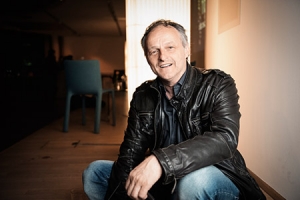Gallery
All Pictures (5)Biography
Christian Wagner was born in Immenstadt on September 26, 1959. He studied German, theatre studies and psychology in Munich, and during that time, he applied three times at German film schools, yet was always rejected. However, he did not resign, but started to work as a self-taught filmmaker instead, focusing on shorts in the beginning. In 1982, he founded "Christian Wagner Filmproduktion", the company that produces all of his films to this day. In 1985, he teamed up with Nico Hofmann and Jan Schütte to establish the independent distribution cooperative "Der andere Blick".
After helming several short and medium length films Wagner completed his feature film debut "Wallers letzter Gang" ("Waller's Last Trip") in 1988. The melancholic and poetic melodrama about the last day of work of a railroad track worker was promptly awarded the Bavarian Film Award, the Preis der Deutschen Filmkritik and a Silver German Film Award. His second film for the big screen, "Transatlantis" (1994), was shot under harsh conditions in the Himalayas and screened as the German entry in the international competition of the Berlin IFF, where it caused a stir.
As part of the episodic film project "Die sieben Todsünden", Wagner shot the 25-minute segment "Zita – ein kurzer Film über die Trägheit" which also marked the first part of his "Balkan Blues Trilogy". At the Torino Film Festival, "Zita" won the Special Prize of the Jury. Wagner then turned to TV, making the critically acclaimed drama "Zehn wahnsinnige Tage" (2000) about a police officer in training (Fabian Busch) who is confronted with the harsh realities of deportation in Germany when he falls in love with an Indian woman.
Subsequently, he used mostly lay actors for his drama "Ghettokids" (2002, TV) about three Greek brothers from a Munich inner city neighborhood. This film and even more so "Stille Sehnsucht – Warchild" ("Warchild", 2004-06) fostered Wagner's reputation as a director of keen and engaging social dramas. "Warchild", the second installment of his "Balkan Blues Trilogy" garnered him a "Spezialpreis" at the Bavarian Film Awards and won the award for Best Screenplay at the Montréal World Film Festival. At that time he also created the video installation "Nichts und wieder nichts" (2003), a collection of images and stories from around the world pertaining to the subject of nothingness. The N-shaped installation consisting of 24 screens was first exhibited at the Shanghai Artsalon in 2003.
The one-hour TV documentary "Die Flucht der Frauen" (2007) marked Wagner's next project. It is about three women who had to flee their East-Prussian and Silesian homes after WWII. "Hopfensommer" (TV, 2011), featuring Gaby Dohm and Elmar Wepper, was a more lightweight comedy about a stubborn hop farmer who has to get along with his long lost son.
"Das Ende der Geduld" premiered at the Munich Film Festival 2014. The sociocritical made-for-TV drama is based on the life of Berlin juvenile judge Kirsten Heisig (played by Martina Gedeck) who presumably committed suicide in 2010. The emotionally intense film received critical acclaim and was awarded the Günter Rohrbach Filmpreis 2015 as well as the Deutscher Schauspielerpreis 2015 (category: "Starker Auftritt" for Mathilde Bundschuh); Martina Gedeck in the lead was nominated for a Bavarian Film Award and a German Film Award.
While working as producer, director and author, Christian Wagner has also taught workshops for the Goethe Institute all around the world. Moreover, he is currently working as a professor for directing, script development and acting at the Filmakademie Baden Württemberg in Ludwigsburg.
